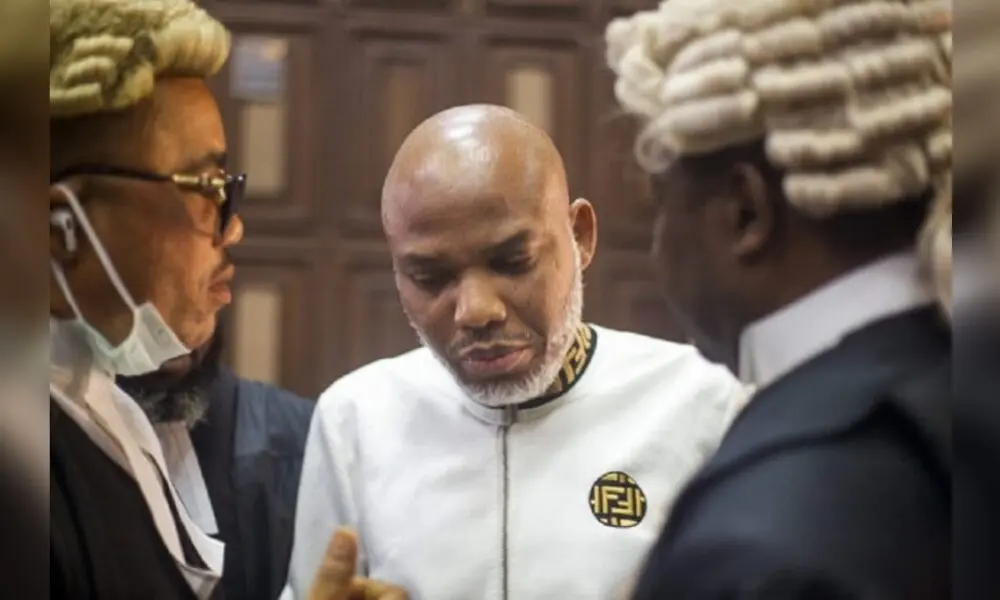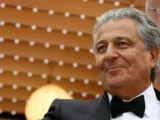
Nnamdi Kanu Jailed for Life, ISWAP Still Collecting Ransom – Same Country
0 Posted By Kaptain KushOn November 20, 2025, Justice James Omotosho of the Federal High Court in Abuja sentenced Mazi Nnamdi Kanu, leader of the Indigenous People of Biafra (IPOB), to life imprisonment on counts 1, 4, 5, and 6 of the seven-count terrorism charge, opting instead for life rather than the death penalty the charges originally carried.
The prosecution, led by the Attorney-General’s office, had withdrawn counts 2, 3, and 7 earlier in the proceedings, describing the outcome as an act of “magnanimity from the Federation.”
Trending Now!!:
- Presidency Fires Back at Atiku Over Lagos-Calabar Coastal Highway
- President Tinubu Approves New N70,000 Minimum Wage for Nigerian Workers
- NYSC Member Raye Blasts Tinubu, Calls Lagos ‘Filthy’ in Viral Rant
- Obasa Vows Legal Battle Over Impeachment, Questions Legitimacy
- Nigeria Reinstates Old National Anthem “Nigeria, We Hail Thee”
The same Federation, however, has extended no such mercy to the perpetrators of far bloodier crimes when they cloak themselves in religious fervor. Kanu’s conviction stems from broadcasts on Radio Biafra where he allegedly incited violence, declared sit-at-home orders enforced by threats, and contributed to unrest during the 2020 EndSARS protests, leading to attacks on security personnel and public infrastructure.
Justice Omotosho, in a scathing judgment, described Kanu as an “arrogant” and “unrepentant” figure who had “turned himself into a tyrant,” slapping his own counsel in court and vowing never to submit to judicial authority.
Quoting scripture to underscore Kanu’s failure as a Christian to heed admonitions against destruction, the judge declared him an “international terrorist” whose actions had sown bloodshed and destabilization across the South-East.
This comes after a decade-long legal saga: Kanu’s initial 2015 arrest in Lagos on treason charges, his 2017 bail jump and exile in the UK, and his controversial 2021 rendition from Kenya, where he was allegedly hooded, sedated, and smuggled back to Nigeria in violation of international law.
Omotosho is the fifth judge to preside over the case, following recusals by Justices Ademola, John Tsoho, and Binta Nyako due to Kanu’s lack of confidence in their impartiality.
Yet, while the state mobilized extraordinary resources—diplomatic pressure on Kenya, secret trials, and four years of solitary confinement in DSS custody—to silence one man armed only with a microphone and a British passport, it has shown glacial indifference to mass murderers who wield actual weapons under the banner of faith.
Recall Deborah Samuel Yakubu, the 22-year-old Christian student in Sokoto, lynched in May 2022 by a Muslim mob for an alleged blasphemous WhatsApp message. Stoned, clubbed, and set ablaze before a cheering crowd, her death ignited national outrage—but only briefly.
Only two suspects were charged, and in October 2024, a Sokoto High Court discharged and acquitted them, ruling that the prosecution had failed to prove its case beyond a reasonable doubt. No appeals followed, no international extraditions were pursued, and the perpetrators returned to hero’s welcomes in parts of northern Nigeria, with local leaders hailing the verdict as “justice served.”
The Sultan of Sokoto issued a mild condemnation, but the Jama’atu Nasril Islam remained silent, and President Bola Tinubu’s administration offered no federal intervention.
Contrast this with the June 5, 2022, massacre at St. Francis Catholic Church in Owo, Ondo State, where gunmen from the Islamic State West Africa Province (ISWAP) slaughtered at least 50 worshippers—men, women, and children—on Pentecost Sunday, bombing the altar and hacking survivors with machetes.
Three years later, not a single mastermind has been apprehended. The Ondo State government vowed swift justice, the Catholic Bishops’ Conference demanded accountability, and the Christian Association of Nigeria (CAN) declared mourning—but the case file languishes, even as ISWAP continues to claim similar raids in Kaduna, Plateau, Benue, Niger, and southern Borno.
In these attacks, pastors are beheaded on video, villages are razed, and captives are auctioned as slaves, yet the Nigerian military’s response is often limited to press releases and occasional airstrikes that miss the mark.
The disparity extends beyond inaction to outright accommodation. Boko Haram and its splinter ISWAP have operated for over a decade, declaring caliphates, collecting taxes from local governments, and negotiating ceasefires with governors in Borno and Yobe.
Their leaders, like Abubakar Shekau (deceased) and current ISWAP head Abu Musab al-Barnawi, have evaded capture despite billions allocated to counter-terrorism. Meanwhile, Kanu’s “sit-at-home” orders—enforced sporadically by unknown gunmen—drew the full wrath of the Terrorism Prevention Act of 2013, which prescribes death or life imprisonment for incitement, the very penalty Omotosho invoked but tempered today.
This selective fury is not confined to the APC-led federal government. Southern Christian leaders, who mobilized pulpits and tithes during the 2023 election to decry the Muslim-Muslim ticket and “Fulani jihadist agenda,” have issued tepid statements on Kanu’s sentencing at best.
The same CAN that thundered against Owo and fake bishops in 2022 has not called for a single day of prayer or mass protest for Kanu, a fellow Igbo Christian whose agitation, in their earlier rhetoric, targeted the same northern Muslim hegemony they professed to dread.
Prominent Pentecostal figures, who turned churches into campaign war rooms for Tinubu-Shettima, now whisper of “due process” while ignoring the rendition’s illegality, as ruled by the ECOWAS Court in 2023.
Northern Muslim elites, quick to label Kanu a “dot in a circle” and demand his execution, extend quiet indulgence to blasphemy mobs and church arsonists.
The Arewa Consultative Forum condemned Kanu’s broadcasts as “barbaric” but has never mustered similar outrage for the 2024 acquittal of Deborah’s killers or the unchecked growth of banditry in Zamfara and Katsina, where Fulani militias—often indistinguishable from herdsmen vigilantes—extort trillions in ransoms annually.
These same voices celebrated when Finland sentenced IPOB’s Simon Ekpa to six years in May 2025 for inciting violence, yet lobbied against extraditing Nigerian-based jihadist propagandists.
Even the South-East’s political class—governors like Chukwuma Soludo and Hope Uzodinma, who rode to power on the backs of IPOB’s #EndSARS foot soldiers—has responded with platitudes about “rule of law” rather than interrogating the double standard: if Kanu merits life for radio rhetoric, why do church-burners and village-raiders merit impunity?
Kanu’s lead counsel, Ifeanyi Ejiofor, vowed an immediate appeal to the Court of Appeal and, if necessary, the Supreme Court, insisting the judgment “does not hold water” and that “Nnamdi Kanu is not going to stand convicted.”
But with the state’s resources arrayed against him, the path ahead mirrors the futility of past appeals in similar cases. Nigeria has mastered the art of calibrated injustice: crush secessionist voices in the South-East with rendition and life sentences, while negotiating with insurgents in the North-East who fly foreign flags and impose sharia by fiat.
You can ambush soldiers, as Kanu allegedly urged, and face Omotosho’s gavel; you can declare a caliphate, as Boko Haram did in 2009, and receive amnesty offers from Abuja.
The 2013 Terrorism Act, under which Kanu was charged, has convicted fewer than 100 in 12 years, mostly low-level agitators like him, while thousands of religious extremists roam free, their atrocities documented in UN reports and Amnesty International dossiers.
Kanu will likely spend his remaining years in a DSS cell for words that echoed the frustrations of millions. Deborah’s killers toast their freedom. Owo’s graves remain unmarked.
Benue’s displacement camps swell. And the Federation, in its magnanimity, pats itself on the back for sparing one life while consigning justice to the graveyard.
This is not the rule of law; it is the reign of selective terror. In today’s Nigeria, your sentence—or lack thereof—hinges not on the blood spilled, but on the deity invoked to justify it and the dialect in which the crime is confessed.


